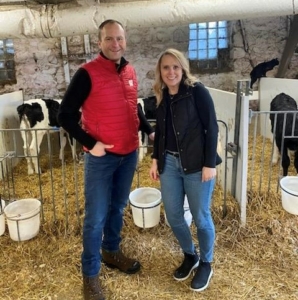Supporting Wisconsin Farmer Resilience Through Challenging Times
By Cassandra Krause
Ask anyone from out of state what the first thing that comes to mind is when they think of Wisconsin, and they’re likely to respond “farms” — and for good reason. Wisconsin farmers work hard to put food on tables across Wisconsin and the globe. Fondly known as “America’s Dairyland,” Wisconsin is also a leading producer of cranberries (the state fruit), soybeans, potatoes, ginseng, corn — the list goes on and on.
According to the Wisconsin Department of Agriculture, Trade, and Consumer Protection (DATCP), agriculture is a major economic driver, contributing $104.8 billion annually to our state’s economy. The state is home to 64,100 farms on 14.2 million acres (the average farm size in Wisconsin is 222 acres). For those working in the industry, farming is not just a profession, but a way of life — one that poses unique stressors and challenges.
Tough Times Made Tougher by the COVID-19 Pandemic
In the years leading up to the COVID-19 pandemic, U.S. farmers were already dealing with damaging weather conditions, increased global competition and tariffs, and falling commodity prices. The U.S. Department of Agriculture (USDA), citing data from the Federal Reserve, reported in July of 2021:
Clear signs of financial distress had emerged among U.S. farmers even prior to the onset of the COVID-19 outbreak. Investment in equipment was down, farmer debt was up, and so was borrowing against land. By the end of 2019, the delinquency rate on commercial loans hit a six-year high, and the delinquency rate on farmland loans was at its highest level since 2013.
When COVID-19 began rapidly spreading and parts of the global economy shut down, the food system was hit by major supply and demand shocks. For example, when demand for milk from restaurants and schools plummeted due to closures, producers were forced to dump milk. Meanwhile, milk supply on grocery store shelves was sparse for consumers purchasing for their homes, and prices rose.

Sara Kohlbeck
is the director of the Division of Suicide Prevention at the Medical College of Wisconsin and a researcher on farmer suicide in Wisconsin.
Especially on small farms, many families rely on income and benefits from jobs outside of the farm and were hurt by job losses due to the pandemic. In addition to the financial stresses of running a family farm, interpersonal issues often come into play between spouses and family members who work together. This is particularly evident when it comes to succession planning and the legacy of a longstanding family tradition.
A 2018 survey from the National Farm Medicine Center, headquartered in Marshfield, showed that 29% of farmers suffered from depression and 35% suffered from anxiety. The National Farm Medicine Center conducts a wide range of research ranging from topics such as child rearing and women on farms to veterans who become farmers. More can be found at marshfieldresearch.org/nfmc.
Sara Kohlbeck is the director of the Division of Suicide Prevention at the Medical College of Wisconsin (MCW) and is researching farmer suicide in Wisconsin for her doctoral dissertation. “Just about every farmer I talked to mentioned finances as a stressor,” said Kohlbeck of interviews conducted for her research. A small, organic farm may be one hailstorm away from being wiped out, and a larger farm may be millions of dollars in debt — the farmers’ entire livelihood can be at stake. While suicide is a relatively rare outcome (about 190 farmers are reported to have died by suicide from 2004–2018), Kohlbeck emphasizes that, “even one is too many.” Suicide rates are disproportionately high among farmers (about 2% of total suicides in Wisconsin, while farmers make up about 1% of the labor force), pointing to a larger mental health concern.
Resources for Farmer Wellness
Wisconsin Farm Center and Farmer Wellness Program
Farmcenter.wi.gov
- Farm Culture Training for Ag Lenders and Ag Service Providers
- Online Farmer and Farm Couple Support Groups
- 24/7 Farmer Wellness Helpline | 888-901-2558
- Tele-counseling | 888-901-2558
- Counseling Vouchers | 800-942-2474
DATCP’s Farm Center started during the farm financial crisis of the 1980s, when farmland values dropped up to 60% in some areas of the Midwest. At its onset, the Farm Center strengthened relationships between ag lenders and farmers. It has since expanded its consulting and referral services to include financial consulting (reviewing balance sheets and cash flow, analyzing profitability and viability, analyzing debt structure, etc.), transition/succession planning (financial stability, operating agreements, tax implications, etc.), and farm mediation (dispute resolution).
The Farm Center’s Farmer Wellness Program began with $200,000 of funding in the 2019–21 biennial state budget and is now in addition funded by USDA grant money and other sources.

Penn Vieau and Karen Endres are hosts of the “Rural Realities” podcast and recently brought their wellness messages to the stage at the WBA Agricultural Bankers Conference.
The Farmer Wellness Program offers services including a 24/7 Wisconsin farmer wellness helpline (888-901-2558), tele-counseling, and counseling vouchers. It also hosts online farmer and farm couple support groups. All of the resources are free of charge to Wisconsin farmers and their families. The services are there for those who are experiencing anxiety or depression, or just need a welcoming ear to talk to. Karen Endres, Farmer Wellness Program coordinator at the Wisconsin Farm Center, explained that the program was designed with the “4 A’s” in mind: affordability, accessibility, acceptability, and awareness. “Our most important resource is our mind,” said Endres. “We need to do a better job of taking care from [the neck] up.”
Endres noted that rural areas lost some of their sense of community during the pandemic as people were no longer seeing each other at coffee shops, card clubs, and so forth. The Farmer Wellness Program’s farmer support groups have served to combat the isolation felt by many farmers and have the added benefit of connecting farmers from around the state who may not otherwise have met but have much in common. Every session is facilitated by a licensed mental health provider with experience serving farmers and/or a trained peer leader.
The helpline, tele-counseling (via phone or Zoom), and vouchers for in-person counseling sessions all connect farmers and their families with licensed mental health professionals. The counselors can help bring control to farmers in navigating challenging situations. One farmer caller who sought mental wellness counseling for the first time through the program said, “please tell every farmer there is hope.”
Shifting the Mindset
Endres teamed up with mindset coach and former banker Penn Vieau to produce the Farm Center’s ‘Rural Realities’ podcast, which provides expert advice that can help farmers reduce stress, improve finances, implement effective farm family communication skills, and more. Vieau recently addressed the Wisconsin Bankers Association (WBA) Agricultural Bankers Conference on the power of a positive mindset and is scheduled to speak at the upcoming WBA Building Our Leaders of Tomorrow (BOLT) Summer Leadership Summit, June 9–10, 2022 in Wisconsin Dells. He discussed how the stigma of mental health in farming communities can be a barrier to getting help. “Stress does not equal crazy,” said Vieau. “When stress is too much to bear, talk to somebody.”
A 2019 American Farm Bureau Federation study revealed that a majority of farmers/farmworkers think the media (72%), people in their local community (58%), and their friends (56%) attach at least a fair amount of stigma to mental health.
How Bankers Can Support Farmer Mental Health
Agricultural bankers are part of rural communities and have strong ties to the farming industry — many grew up on or live on farms themselves. MCW’s Kohlbeck said bankers may be coming into contact with farmers more often than their doctors. “We’re not expecting them to be therapists, but in some ways, bankers can be nontraditional helpers,” she said. She said the most important ways bankers can help are 1) sharing resources and 2) understanding the red flags and what to do about them.

Karen Endres
Farmer Wellness Program Coordinator
Wisconsin Farm Center
Endres underscored, “bankers are relationship people, and they want to do what’s best.” She recommends the Farmer Wellness Program’s online farm culture training for agricultural service providers. It is a free, virtual course to help ag lenders and other service providers understand the unique stresses and challenges of farming, handle difficult conversations, and recognize signs and symptoms of stress with farm clients. More information and the link to register are available at farmcenter.wi.gov.
One piece of advice Vieau offered the attendees of his presentation was to create a “personal board of directors” for their mental wellbeing — in other words, identify a group of close contacts to serve as trusted advisors and consultants. He pointed out that a banker is most likely already on a farmer’s “personal board of directors,” so the banker has a unique opportunity to share a flyer or card for the Farm Center’s services. “Bankers are always offering a value-add, like sharing trending reports,” said Vieau, and likened the practice to hospitality staff offering tips on local attractions. He said it’s a great idea for bankers to use the resources and information offered by the Farm Center for themselves personally and as an added service for their clients.
To learn how to spot the signs of distress in farmers, bankers and community members may participate in gatekeeper training for lay people. The Wisconsin Chapter of the American Foundation for Suicide Prevention is one example of an organization that offers free, one-hour training sessions online and in person.
The Outlook
All of the experts interviewed for this story agreed that more can be done to build more supportive communities and policies for farmers. “Instead of expecting farmers to reach out, we need to reach in,” said Kohlbeck. “Farmers are proud. For policies on things like climate change, don’t put the onus on farmers to solve the problems on their own.”

Penn Vieau
Professional Speaker and Coach
Vieau noted, “we spend a lot of time with [corporate] executives doing leadership training, and we need to do the same to break the stigma with farmers, who are independent businesspeople.” He highlighted that this focus is also important in encouraging the next generation of young people, who prioritize mental wellness in their careers, to become farmers.
Similarly, Endres expressed the need for everyone to look out for our farmers, who are stewards of the land and grow our food. She encourages community members to talk to one another and direct those who could benefit from a resource or service on how to access it.
“If one person shares a resource and saves a life, that’s a pretty great day,” concluded Endres.
If you are thinking about suicide or are concerned about the wellbeing of someone you know, call the Wisconsin Lifeline at the National Suicide Prevention Lifeline (800-273-8255), the Wisconsin Farmer Wellness Helpline (888-901-2558), or 911.





